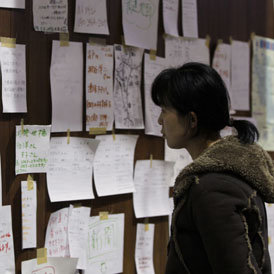Japan: British citizens among tsunami missing
The Foreign Office confirms there are no reports of British deaths in Japan yet – but there are severe concerns for a number of citizens as Channel 4 News learns of lucky UK survivors.

No official deaths of British citizens have yet been registered after Friday’s devastating tsunami that has killed thousands, with many more still missing across north east Japan.
Despite this the Foreign Office confirmed that they have serious concerns for a number of UK citizens missing in Japan. The British Ambassador for Japan and their consular staff are in the Sendai region to find and help any missing British nationals.47 additional consular officials are in the country try and establish if anyone Britons were caught up in the devastating wave.
We do not yet know the full and dreadful death toll, nor can anyone truly understand the impact these events will have. David Cameron
The British Search and Rescue team has been deployed by the DFID (Department for International Development) and are stationed 20km outside Ofunato in the north east of Japan and are working alongside a team from the US.
Prime Minister David Cameron said in a statement to MPs: “The devastation we are witnessing in Japan is of course of truly colossal proportions. It has been heart-breaking to listen to people who have had all their relatives, their friends, their possessions and their homes simply washed away. Those who have survived will not recognise the place where their homes once stood.
“We do not yet know the full and dreadful death toll, nor can anyone truly understand the impact these events will have, but Japan and the Japanese people are a resilient and resourceful nation. Britain and the British people are your friends and we have no doubt you will recover.”
Channel 4 News has heard the tales of lucky Britons who survived the disaster. Paul Harris, 54, from Birmingham, was giving a private English lesson in a department store in Sendai when the quake struck. He was ushered down to the basement of the building, where he took shelter from the shock in a move which probably saved his life.
But he did not stay there long. His relieved mother Daphne Harris, 82, said he ventured out after only a few hours to make sure his partner, Kayoko, was safe.
When he rang this morning I was overjoyed… You don’t know if it is bad news. When I heard his voice, well, it was absolutely fantastic. Daphne Harris
“He wanted to contact his partner so he left the department store basement and returned to their apartment, which is up a mountain in Sendai,” she said.
“Everything in the house that could come down had come down, but Kayoko survived by sheltering under the table.” Mrs Harris, who heard from her son only today, was overjoyed at the good news. “A cloud has been hanging over us and now it’s been lifted,” she said. “I can’t believe it.”
“When he rang this morning I was overjoyed – I was in bed still, it was 7am. You don’t know if it is bad news. When I heard his voice, well, it was absolutely fantastic, and he sounded good and I was thinking he’s been through a lot it’s a very, very. very bad experience – it will affect him but he seemed alright.
Channel 4 News special report - Japan: tsunami to nuclear crisis
At Heathrow airport the first people returning from Japan made touched down, a mixture of tourists and those looking to get out of the country as concerns of a nuclear threat and further earthquakes mount. One traveller spoke of the continuing aftershocks felt in the country’s capital: “We had a tremor even this morning, at Nahita airport in Tokyo at 10 o’clock, quite a heavy one.”
Another passenger at arrivals spoke of the advice being given to British nationals: “We had a phone call from the British embassy who because they knew we were there said can you go home now because of what’s going on with the nuclear reactor, and i think now we’ve just heard there was another explosion, so thank God we’re out.”
Alex Thomson has witnessed devastating scenes at Kesennuma:
As so often with this situation, I'm not sure where to begin in depicting the peculiarity of the pain that this town's people are now undergoing. But let's start at the harbour side.
You look out over the placid waters of a wonderfully sheltered and deep natural harbour and you wonder if, in its placid state, how what happened could have happened.
The stillness and peace broken only by the nagging echoing call of crows and above them the giveaway squadrons of circling buzzards. Across the harbour there are ships reduced to blackened hulks - some still afloat, others upended.
And all around, flung about on the quayside seven or eight ocean going tuna vessels, smashed into crumpled houses leaning against warehouses, slumped against crippled derricks.
Some of them have been left high and dry more than a hundred yards across the dockside. We wander around for some reason touching the vast propellers of these ships, now silent hulks, slowly weeping their toxic black bunker oil into the wrecked chaos of what was a harbour.
A man walks up. He smells like he's been drinking for days. "This is my house," he says. But all I see are four huge tuna factory ships standing in an undergrowth of chains, slime, twisted metal and random smashed up cars. "This - my house," he says again.
Read more from Alex Thomson in his Channel 4 News blog.